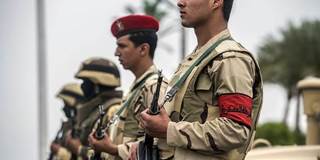One of the main justifications for the 2013 military coup in Egypt was to counter violence and terrorism. Instead, violence and terrorism have surged as government repression has fueled a stubborn insurgency – and there is no sign of de-escalation, much less reconciliation, in sight.
LONDON – “I have a request for all Egyptians,” General Abdel Fattah El-Sisi, Egypt’s president, declared in 2013. Just three weeks after staging the most brutal military coup in Egypt’s history, he wanted “all honorable, decent Egyptians” to take to the streets to march for the military, thereby giving him and his army “a mandate and an order to fight potential violence and terrorism.” Tens of thousands of Egyptians heeded his call. Yet, three years later, the violence and terrorism Sisi pledged to prevent remain a potent reality.

LONDON – “I have a request for all Egyptians,” General Abdel Fattah El-Sisi, Egypt’s president, declared in 2013. Just three weeks after staging the most brutal military coup in Egypt’s history, he wanted “all honorable, decent Egyptians” to take to the streets to march for the military, thereby giving him and his army “a mandate and an order to fight potential violence and terrorism.” Tens of thousands of Egyptians heeded his call. Yet, three years later, the violence and terrorism Sisi pledged to prevent remain a potent reality.